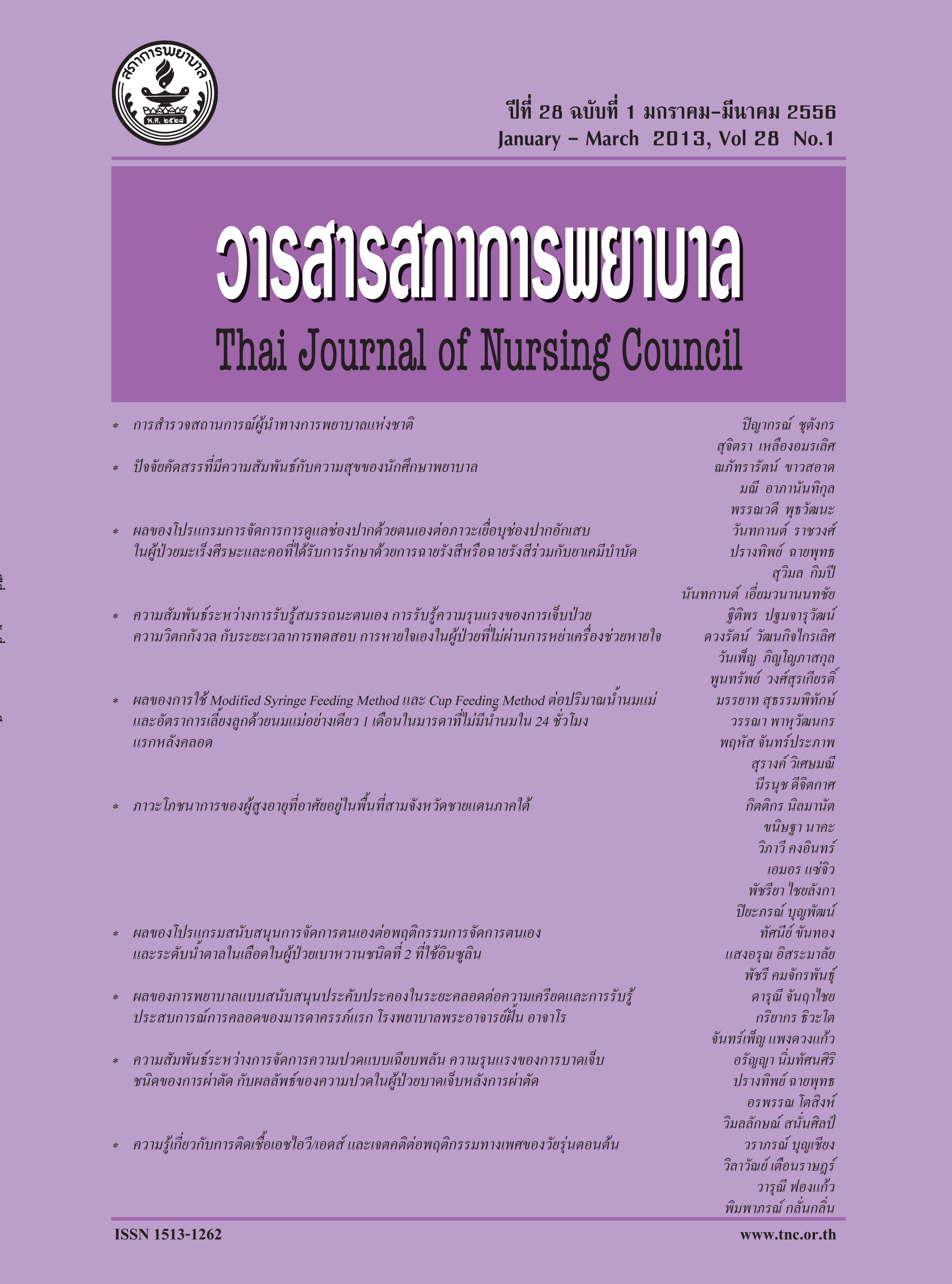ผลของโปรแกรมสนับสนุนการจัดการตนเองต่อพฤติกรรมการจัดการตนเอง
Keywords:
การจัดการตนเอง, เบาหวานชนิดที่ 2 ที่ใช้อินซูลิน, ระดับนํ้าตาลในเลือด self-management, category 2 insulin-dependent diabetes patientsAbstract
ทัศนีย์ ขันทอง
แสงอรุณ อิสระมาลัย
พัชรี คมจักรพันธุ์
บทคัดย่อ:
วัตถุประสงค์: เพื่อศึกษาผลของโปรแกรมสนับสนุนการจัดการตนเองต่อพฤติกรรมการจัดการตนเอง และระดับนํ้าตาลในเลือดของผู้ป่วยเบาหวานชนิดที่ 2 ที่ใช้อินซูลิน
รูปแบบการวิจัย: การวิจัยกึ่งทดลองกลุ่มเดียว แบบอนุกรมเวลา (One group time series design)
วิธีดำเนินการวิจัย: กลุ่มตัวอย่าง จำนวน 30 ราย คัดเลือกแบบเฉพาะเจาะจงตามคุณสมบัติ ที่กำหนด การวิจัยแบ่งออกเป็น 2 ช่วง คือ ช่วงควบคุม กลุ่มตัวอย่างได้รับโปรแกรมการดูแลตามปกติ และช่วงทดลอง กลุ่มตัวอย่างได้รับโปรแกรมสนับสนุนการจัดการตนเอง ซึ่งประกอบด้วย การเสริมทักษะการจัดการตนเองตามแนวคิดของแคนเฟอร์และแกลิกค์ ร่วมกับการวัดระดับนํ้าตาลในเลือด ด้วยตนเอง การสนับสนุนต่อเนื่องโดยการเยี่ยมบ้าน และให้คำปรึกษาทางโทรศัพท์ ประเมินผลก่อน และหลังการทดลองในสัปดาห์ที่ 1 และ สัปดาห์ที่ 4 ทั้งช่วงควบคุมและช่วงทดลองโดยใช้แบบ วัดพฤติกรรมการจัดการตนเอง การวิเคราะห์ข้อมูลทั่วไปใช้สถิติบรรยาย การทดสอบสมมติฐาน ใช้สถิติทีคู่ และวิเคราะห์ความแปรปรวนทางเดียวแบบวัดซํ้า
ผลการวิจัย: โปรแกรมการดูแลตามปกติและโปรแกรมสนับสนุนการจัดการตนเอง ต่างมีผล ในการพัฒนาพฤติกรรมการจัดการตนเองของผู้ป่วยเบาหวานชนิดที่ 2 ที่ใช้อินซูลินได้ดีขึ้นกว่าก่อนเข้าร่วมโปรแกรมอย่างมีนัยสำคัญทางสถิติ (p < .05 และ p < .001 ตามลำดับ) อย่างไรก็ตามโปรแกรมสนับสนุนการจัดการตนเองเท่านั้นที่สามารถลดระดับนํ้าตาลในเลือดภายหลังสิ้นสุด โปรแกรมอย่างมีนัยสำคัญสถิติ ( p < .001)
ข้อเสนอแนะ: โปรแกรมสนับสนุนการจัดการตนเองนี้สามารถนำไปใช้พัฒนาคุณภาพ การดูแลผู้ป่วย เบาหวานชนิดที่ 2 และขยายผลโดยการศึกษาระยะยาว เพื่อติดตามค่านํ้าตาล เฉลี่ยสะสม (HbA1C) และผลลัพธ์อื่นๆ ต่อไป
วารสารสภาการพยาบาล 2556; 28(1) 85-99
คำสำคัญ: การจัดการตนเอง เบาหวานชนิดที่ 2 ที่ใช้อินซูลิน ระดับนํ้าตาลในเลือด
Impact of a Self-Managed Supporting Programme on Self-Management
Behaviour and Sugar Levels in Category 2 Insulin-Dependent Diabetes Patients
Tasanee Khunthong, M.S.N
Sang-arun Isaramalai, Ph.D (Nursing)
Patcharee Komjakraphan, Ph.D (Nursing)
Abstract: Objective: To examine the impact of a self-managed supporting programme on selfmanagement behaviour and blood sugar levels in category 2 insulin-dependent diabetes patients.
Research Type: One-group time series design.
Research Procedure: The population consisted of 30 patients selected by means of purposive, qualification-based sampling. The research was conducted in two stages. During the controlled stage, the sample received a regular care programme. During the experimental stage,the sample was given a self-managed supporting programme, whichconsisted of (a) selfmanagement skill enhancement based on Kanfer and Gaelick’s concept; (b) self-performed fasting blood sugar tests; (c) on-going support through home visits; and (d) counselling by phone. Evaluation, conducted in the first and fourth weeks of both the ontrolled and experimental stages, was based on a self-management behaviour form. The data obtained were analysed using descriptive statistics, and the hypotheses were tested using Paired T Statistics and Repeated Measures ANOVA.
Research Findings: Both the regular care programme and the self-managed supporting programme resulted in statistically significant post-experimental improvement in the self-care behaviour of category 2 insulin-dependent diabetes patients (p < .05 and p < .001,respectively). However, only the self-managed supporting programme effectively reduced the blood sugar levels, which had declined significantly (p < .001) at the end of the experiment.
Recommendations: This self-managed supporting programme could be applied to category 2 diabetes patients’ self-care improvement. Moreover, further research into the application of the programme to the tracking of HbA1C and other outcomes is recommended
Thai Journal of Nursing Council 2013; 28(1) 85-99
Keywords: self-management; category 2 insulin-dependent diabetes patients








